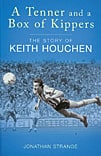 The Story of Keith Houchen
The Story of Keith Houchen
by Jonathan Strange
Tempus, £14.99
Reviewed by David Jenkins
From WSC 242 April 2007
Just as – to quote Monty Python – strange women lying in ponds distributing swords is no basis for a system of government, so, one might think, one diving header in an FA Cup final is surely no justification for a biography.
Keith Houchen’s spectacular goal for Coventry in 1987 remains the highlight of arguably the last memorable final before the event became a bore-fest monopolised by the so-called Big Four. But the likeable “Houch” did little thereafter and not much more – one penalty that enabled York to knock out Arsenal on a frozen pitch at Bootham Crescent – before. Only in football and reality TV, it seems, are trees felled on such a slender basis.
As it happens, both titles of this book are slightly misleading. Although called The Story of Keith Houchen, this book is more often a chaotic stroll through the backwaters of English football and England itself – with a little bit of Scotland thrown in. So between snippets of Houchen’s journey up and down the country playing for Hartlepool, Orient, York, Scunthorpe, Coventry, Hibs, Port Vale and back to Hartlepool, we get incongruous forays into local history and lore.
The chapter on York, for example, begins with a history of the city which, in the course of a couple of pages, takes us breathlessly from Eric Bloodaxe to Charles Dickens’ unwilling participation in a railway accident in Kent. It’s all done in a word-association style; if I were to tell you that this is a very interesting book and that the first Englishman to print books was William Caxton, you would get some idea.
There are also grating flowery passages, such as the one on FA Cup draws: “What egalitarian balls they were! Having charted the progress of Bishop Auckland, the same number might later secure the destiny of Liverpool. It could be made up as The Mayor of Casterbridge, but happily recast as Hotspur!” Clearly the state wasted its cash on my education, as I haven’t a clue what that means.
In search of a literary evocation of a journeyman footballer, all Strange manages is a jumble sale of pretension and mundane detail. Bizarre excursions are inter-cut with quotes from Keith himself, contemporary passages from local newspapers and even, at one point, some fan-crafted poetry in the style of William McGonagall.
As Wembley approaches, Strange, a Coventry fan, understandably finds the temptation to digress into trivia easier to resist and the book reads more like a genuine insight into a sporting world than a travelogue. Despite its aberrations, any supporter of Coventry City and Hartlepool, especially, will find something here to interest them. But generally there is too little Keith and too much packing. And the ten pound note and the kippers? Sadly, that’s a bit misleading, too, referring to an unnamed Hartlepool manager who once, legend has it, secured the transfer of a player for said cash and fish. It wasn’t Keith Houchen.